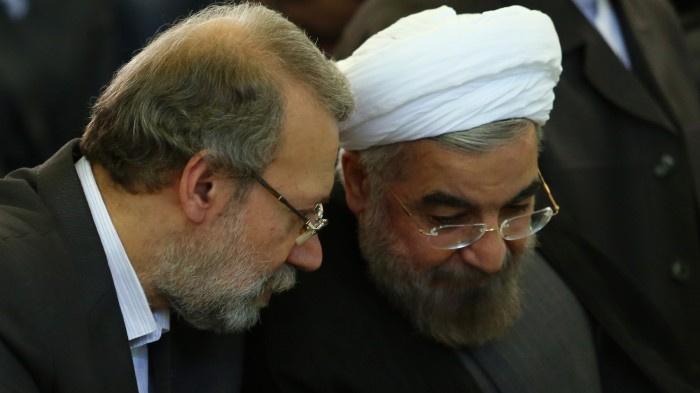Will Rouhani Turn Towards Moderate Principlists?

The most important electoral news of the recent days was the private meeting between four senior Principlist figures. Head of the Strategic Research Center Ali-Akbar Velayati, former and incumbent speakers of the parliament Ali-Akbar Nategh Nouri and Ali Larijani, and former Prosecutor General Ayatollah Moghtadaei had gathered in order to discuss ways to forge an alliance between the moderate Principlist faction. Three days ago Mohammad-Reza Aref, a senior Reformist figure and a potential candidate for the parliamentary election, had advised the moderate camp to follow the 2013 election pattern and form an alliance with the Reformists to win the upcoming parliamentary election. Heshmatollah Falahatpisheh, a former member of the parliament and a Principlist figure, comments on the story:
The main objective of the moderate Principlist front is to preserve its current status as the majority in the parliament, but with new faces. Larijani knows that a number of his supporters inside the parliament are neither strong figures nor can win the elections in their constituency with certainty. Thus, he is negotiating with popular technocrat figures of the pro-Rouhani camp.
Nonetheless, there is a clear distinction before and after the Guardian Council announces the list of eligible candidates. The pre-approval phase is time for shaping the electoral agenda. The three main political currents, the Principlists, the Reformists and the pro-Rouhani forces are acting prudently, being careful to keep their options free. The time for alliance and forming electoral slates will begin only after the qualified candidates are announced.
What the government pursues is forming a reliable, supportive majority in the parliament. Even a weak majority or a plurality that can form alliances with other factions can be useful for the government. The government is now swinging between the Principlists and the Reformists. It is aware that senior, influential Reformist figures will not be allowed to enter the election. However, if it does not wield its influence to open the way for the Reformists’ participation in parliamentary elections, disillusionment among his Reformist supporters is predictable; and Rouhani needs the Reformist support for the 2017 presidential election where he will most likely compete with a Principlist figure. On the other hand, Rouhani knows that alliance with moderate Principlists will help him to form a majority in the parliament. Thus, for now the government will be holding parallel negotiations with both Principlists and Reformists. Reformist candidates will be the government’s preferred option if they pass the Guardian Council filter, knowing that their support can help him secure a second round of presidency.
The Reformist camp faces a dilemma. Inside the camp there are two factions with distinct attitudes towards elections and participation. The idealist camp stresses its identity and wants to advocate the basic essential Reformist agenda, even if it means being left out of alliances. This faction harks back to those Reformists who believed in boycotting the elections in case their top figures were disqualified. However, the majority of the Reformists believe in bargaining with other political groups and forming a powerful, vocal minority in Majles, the parliament. The Reformists will probably introduce figures who have a clear Reformist background, with no negative record during the 2009 post-election incidents.
The third front, the moderate Principlists, aim to hitch their wagon to the pro-government forces. They feel no threat from the side of hardliner Principlists, believing that the more their contrast with the hardliners, the higher their chance of success in the election. The pro-moderation atmosphere of politics and public opinion encourages moderate Principlists to distance themselves from the hardliners.
* This piece was originally published in Fararu, a moderate website affiliated with Tehran’s mayor Mohammad-Bagher Ghalibaf.

